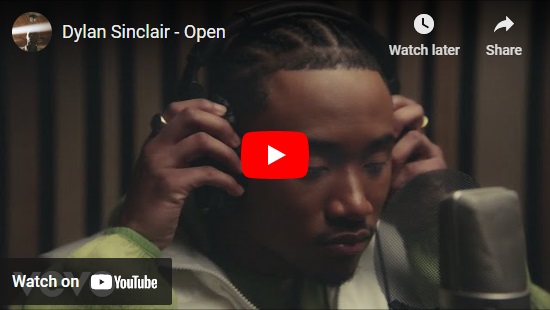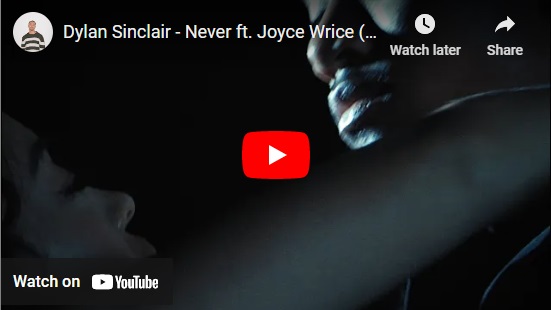“Life comes at you fast” is an adage that has certainly proven true for Toronto singer-songwriter Dylan Sinclair. In the last six years, he’s gone from fledgling high school slam poet to one of Canada’s most promising R&B stars, racking up millions of streams, glowing critical acclaim, and a JUNO nomination for his 2020 effort, Proverb. The accolades were welcome — but also set an impossibly high standard, as the songster set out to write his follow-up.
“I felt a bit of pressure,” says Sinclair of his fast success. “But I think people tend to fall under pressure when they focus on it too much. I’m focused on growing as a person, and as an artist, and on being as consistent as I can be without killing myself over it. I’m not gonna drown in the pressure.”
That determined attitude underpinned Sinclair’s approach to the writing on No Longer in the Suburbs, the amorous, pensive effort that finds the 21-year-old grappling with everything from his newfound fame to burgeoning adulthood, and complicated relationships. Compared to his peers, Sinclair’s sound on Suburbs is markedly nostalgic, bringing to mind such veterans as Jon B and Musiq Soulchild. Sinclair says that’s due to the soundtrack he played during the writing process.
“I was listening to a lot of R&B from the kings, Usher and Chris Brown, non-stop,” says the Filipino-Guyanese crooner. “I listened to albums like Confessions and women’s groups like 702 and SWV. All of the feel-good, Black romance music.” The influences shine through heavily, especially on tracks like the pleading, affectionate “Open,”, or on “Suppress” – where a clear-eyed Sinclair reflects on his romantic relationship with the self-awareness of a young Donell Jones.
Beyond the very obvious old-school thread in Suburbs are other ingredients that distinguish Sinclair from his peers, among them a sincere and consistent tenderness that he credits to his church beginnings. Regardless of the lyrical subject matter, there’s something uniquely mellow and soft-hearted about Sinclair’s approach to this album, a holdover from the praise and worship sessions he fondly remembers form childhood.
“I want to build a world that brings people peace. The goal is to make beautiful music, and the church is filled with beautiful music and singing,” says Sinclair. “I never really gravitated toward [more aggressive] music because I came from a space where there were singalongs, and harmonizing, and real instruments. The [Gospel] influence just creeps into my music somehow, I don’t consciously do it. I do whatever feels good, instinctually. I automatically do my three-part harmonies because that’s what we did at our worship sessions at home. And the melodies I choose are about singing together. It’s so much more beautiful that way.”
“I want to build a world that brings people peace. The goal is to make beautiful music.”
A solid team of collaborators was also a requirement for Sinclair’s process on Suburbs, and his teammates are more than just industry colleagues — they’re his actual friends. “Jordon Manswell, he’s my right-hand guy,” Sinclair says, referring to the Grammy-nominated producer whose credits include Proverb, Daniel Caesar, and Mariah Carey. Musician and producer Alex Ernewein (Caesar, Charlotte Day Wilson) also gets a shout-out, as does Zachary Simmonds, a producer and close friend who happens to be Caesar’s younger brother.
The friendship — and musical partnership — between Sinclair and Simmonds dates back to before either person was born (four days apart at that). Their fathers, Kevin Sinclair and Norwill Simmonds, released a Gospel album back in the early aughts, and the two families have continued to bond in the decades that followed. Now, their children are picking up where the two patriarchs left off.
“Zach and I are the same age. He’s the producer, I’m the songwriter. This has been our story; our come-up together,” says Sinclair. That journey includes making music, of course, but also ample hangouts, and frequent trips out of town for a change of scenery. While they worked on Suburbs, the crew went everywhere from Fort Erie to Montréal, with the aim of getting out and seeing the world. The goal was to live life, then bring those experiences back to the studio to recount them in song. The trips also gave Sinclair a break from the pressures of mounting fame.
“It really is a group effort, and it’s more fun that way. I’ve locked myself in my room to try to work, and it’s not fun. [I need] that work-life balance,” says Sinclair. “I think a lot of people kinda hibernate in the studio and search for anything for inspiration. The music loses its substance. My focus is on making sure we’re living, and doing things, so that the music feels full, and like it’s coming from a real place.”
That same authenticity was important when choosing features for the album. On the deluxe version of Suburbs, hot up-and-comers like Destin Conrad, Jvck James, and Joyce Wrice make appearances; all artists of whom Sinclair was a proper fan, before he could even fathom the collaborations. He says that such full-circle moments – like the transition from listening to Wrice in high school to singing alongside her on the slow jam “Never” – are what keep him inspired.
“My inspiration [fades] quickly,” says Sinclair. “When it comes back, it’s usually from a full-circle moment – like watching the JUNOs and the next thing you know I get a nod. Same thing with Joyce and working with her. That was a very big moment for me! That makes me want to go back in the studio and work so much more.”

